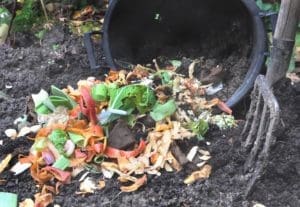Compost is an excellent and inexpensive source of nutrition for any garden. Some people think mulch and compost are interchangeable, but the latter is always organic material that breaks down through the action of aerobic and anaerobic bacteria. Mulch can be made of materials as varied as newspaper, fruits and vegetable peels, coffee and even egg shells.
The compost material does several things:
Compost serves primarily as a soil conditioner. Increases the ability to hold the moisture capacity of sandy soils, thereby reducing drought damage to plants. Whether it’s spread in a layer on top of the soil surface or mixed in. Garden soil that is regularly amended with compost is better able to hold air and water, drains more efficiently, and contains a nutrient reserve that plants can draw on. As a soil additive, it improves the drainage of the soil by adding humus. Humus is porous, partially decomposed matter from plants or animals.
Unlike chemical fertilizers, it enriches the soil gently over time. Chemical fertilizers that are too strong or used incorrectly kill earthworms, “good” types of bacteria and other organisms that enrich the soil. It lasts a long time. Chemical fertilizers tend to degrade after a short time.
Because it is slow acting, its nutrients often have a neutral pH. This protects the soil against sudden shifts from alkaline to acidic.
It helps oxygen get into the soil. It provides food for earthworms, which are essential to the soil’s health.
Composting is an excellent way to recycle kitchen waste such as peels, husks and wilted leaves. Sawdust, old newspaper, used napkins, eggshells, straw, autumn leaves, deadheaded flowers, and grass clippings can go into the composting bin. Much of the material should be shredded, for the smaller the pieces of material, the faster they decompose. However, larger pieces help aerate the composting pile. Some gardeners add an activator to make the decomposition go a little faster. An activator is a powder made of beneficial bacteria. Items that shouldn’t be added to compost include the manure of carnivorous animals, alkaline soil, and plants that have died of disease or infestation.
Once outside, the pile should be covered with a tarp or black plastic or should be placed in a bin with a lid to protect the bacteria. It should be watered regularly and kept moist but not sopping wet. If allowed to dry out, the materials won’t decompose. Some people who live in an area with regular rainfall simply uncover their pile during a storm, let it get rained on then cover it back up.
It is best to turn the pile every two to seven days to oxygenate it. Adding oxygen encourages aerobic bacteria. These bacteria produce less of a smell, and their activity heats the pile, which kills pathogens. They also work faster than anaerobic bacteria. Turning the composting pile every day risks over-ventilation and low nitrogen levels.
Some gardeners like to fork loads of organic material over their garden, but some experts recommend that a layer about an inch thick be added to the garden in the spring. Another inch or two can be added during the growing season. This soil additive not only adds nutrients but keeps the soil cool in the summer, warm in the winter and smothers weeds.
Whether you’re new to gardening or switching to Organic, Hilton Landscape Supply has compost and topsoils available to you by the bag or in bulk. With the largest and most complete selection of rock, soil conditioners and general landscaping products and accessories, Hilton Landscape Supply continues to be the choice for Southern Oregon’s gardeners.

